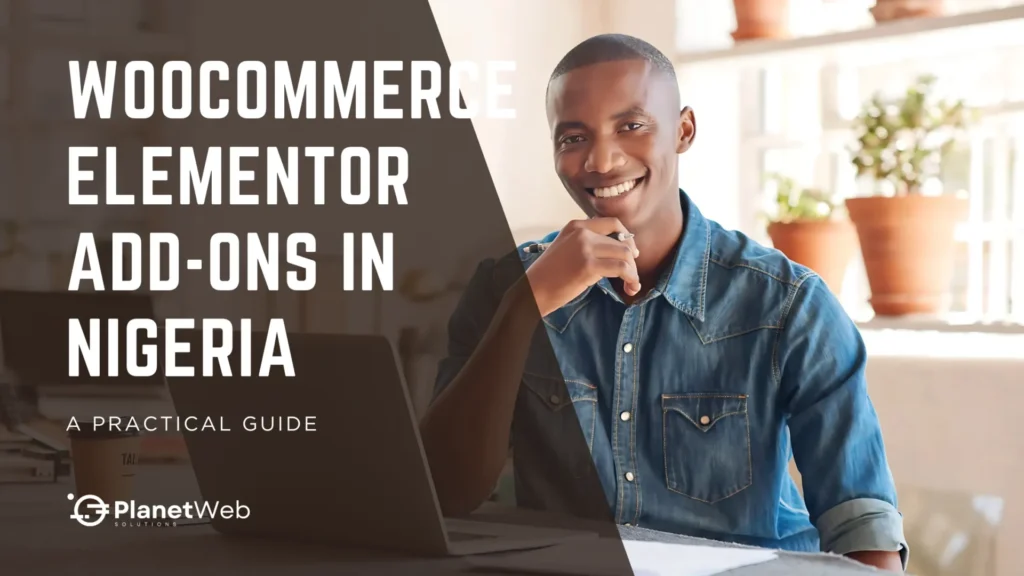🗓️ Last updated: September 20, 2025
WooCommerce Elementor add-ons in Nigeria: The Practical Playbook
Nigeria’s e-commerce market is exploding. From Lagos fashion boutiques to Abuja tech retailers, businesses are rushing online to tap into the country’s growing digital economy. But here’s the problem: most “best WooCommerce add-ons” articles were written for American or European businesses.
Try following their advice, and you’ll quickly run into problems. The payment gateway they recommend doesn’t support Paystack. The shipping calculator can’t integrate with GIGL or Kwik Delivery. Even the “lightweight” plugin crashes your shared hosting. And then there’s NDPA compliance to think about.
After working with Nigerian businesses at PlanetWeb, we’ve learned which WooCommerce Elementor add-ons in Nigeria actually work in the local market. This isn’t a generic list; it’s a practical playbook for choosing add-ons that will help your store succeed, not struggle. For broader insights on building WordPress sites for Nigerian businesses, see our WordPress website guide for Nigerian businesses.
Common Pitfalls Nigerian Businesses Face
Before we dive into solutions, let’s talk about the mistakes we see businesses make every week:
Using plugins that don’t support local payment gateways. You install a beautiful checkout add-on only to discover it breaks Paystack integration. Your customers can’t pay, and you lose sales.
Overloading shared hosting with heavy add-ons. Most Nigerian businesses start on shared hosting. Loading up your site with resource-heavy plugins leads to slow loading times, crashes, and frustrated customers who abandon their carts.
Ignoring the Nigeria Data Protection Act 2023 (NDPA) compliance. The Nigeria Data Protection Act isn’t just paperwork. If you’re collecting customer data (which every e-commerce store does), you need add-ons that handle privacy correctly. Getting this wrong can mean serious legal trouble.
Underestimating mobile-first optimization. Over 80% of Nigerian internet users browse primarily on mobile devices, often on 3G or 4G connections. Add-ons that work perfectly on your desktop might be unusable for your actual customers.
Skipping proper testing. You see a great add-on review, install it immediately on your live site, and discover it conflicts with your theme or breaks your checkout flow. Lost sales, frustrated customers, and hours of troubleshooting.
These aren’t hypothetical problems. We see them constantly, and they’re expensive mistakes that can kill your business momentum.
What Makes WooCommerce Elementor Add-ons Right for Nigerian Stores
Not all WooCommerce add-ons are created equal, especially for Nigerian businesses. Here’s what to look for:
Local payment and banking integrations. The add-on must play nicely with Paystack, Flutterwave, and other Nigerian payment processors. Bonus points if it supports bank transfer options that Nigerian customers prefer.
Shipping and delivery support. Can it integrate with Kwik Delivery, GIGL, Sendbox, or other local logistics companies? Does it handle the complex address system in Nigerian cities where “house behind the big tree” is a valid address?
Mobile-first performance. The add-on should load quickly on slower connections and work perfectly on small screens. If it requires multiple JavaScript libraries or loads heavy images, it’s probably not right for the Nigerian market.
Lightweight for shared hosting. Most Nigerian startups begin on shared hosting. The add-on should work efficiently without consuming excessive server resources or causing timeouts.
NDPA compliance and customer trust. Look for add-ons that include proper data handling, consent management, and privacy features. Nigerian customers are becoming more privacy-conscious.
Pricing that makes sense in Naira. A $299/year plugin might be reasonable for a US business, but that’s over ₦400,000 for a Nigerian startup. Look for add-ons with fair pricing or good free versions.
Best WooCommerce Elementor Add-ons in Nigeria by Budget
Let’s break this down by what you can actually afford:
| Tier | Annual Budget | Core Priorities | Typical Add-ons |
|---|---|---|---|
| Bootstrap | ₦0 – ₦50,000 | Payments, WhatsApp, invoices, basics | Essential Addons (Free), Paystack, PDF Invoices, WhatsApp chat |
| Growing | ₦50,000 – ₦200,000 | Better PDP/PLP (product detail/listing pages), checkout, diaspora, shipping | ShopEngine Pro, Multi-Currency, Advanced Shipping, Flutterwave |
| Enterprise | ₦200,000+ | Pricing logic, subscriptions, compliance | Dynamic Pricing, Subscriptions, Memberships, Security suite |
Bootstrap Budget (₦0 – ₦50,000/year)
Who it’s for: first-time founders validating demand on shared hosting.
Essential stack: Essential Addons (Free), Paystack WooCommerce Gateway (Free), PDF Invoices (Free), WhatsApp Chat (Free), and built-in shipping zones.
Upgrade trigger: Monthly revenue hits ₦500,000 or international sales requests.
Growing Business (₦50,000 – ₦200,000/year)
Who it’s for: stores with steady orders that need better product detail/listing pages, cleaner checkout, diaspora pricing, and smarter shipping.
Enhanced capabilities: ShopEngine Pro (₦45,000), WooCommerce Multi-Currency (₦65,000), Advanced Shipping (₦35,000), and Flutterwave integration.
Upgrade trigger: Monthly revenue above ₦2,000,000 or complex business requirements.
Enterprise (₦200,000+/year)
Who it’s for: established brands with complex catalogs, B2B or subscriptions, and stronger compliance needs.
Advanced optimization: Dynamic Pricing (₦85,000), WooCommerce Subscriptions (₦120,000), Product Fields (₦75,000), Memberships (₦85,000), Security Suite (₦100,000).
ROI focus: Each add-on must demonstrably increase revenue or reduce costs.
Add-ons by Nigerian Business Type
Fashion Retailers: Size chart widgets, Instagram shop integration, color swatches, and customer photo reviews work best. Nigerian shoppers want to see products on real people.
Food Delivery: WhatsApp ordering integration, real-time tracking with local couriers, location-based minimum orders, and delivery time slots for Lagos traffic.
Tech Retailers: Multi-currency pricing for diaspora customers, warranty management, product comparison tables, and B2B bulk pricing for institutional buyers.
Digital Creators: Subscription tools that handle failed Nigerian card payments, secure downloads with resumption features, affiliate management, and content dripping for courses.
WhatsApp Integration: The Game Changer
Here’s something most WooCommerce guides completely miss: WhatsApp is the real sales channel in Nigeria.
While American businesses focus on email marketing, Nigerian customers live on WhatsApp. They use it for customer service, order updates, payment confirmations, and referrals. If your WooCommerce store doesn’t integrate with WhatsApp, you’re missing out on significant opportunities.
Best WhatsApp add-ons for Nigerian stores:
WhatsApp Cart for WooCommerce: Lets customers send their entire cart to WhatsApp with one click. They can complete the purchase through chat, which many prefer over online checkout.
Order Notifications via WhatsApp: Automatically send order confirmations, shipping updates, and delivery notifications through WhatsApp instead of email.
WhatsApp Customer Support: Add a floating WhatsApp button that includes pre-filled messages like “I need help with my order” or “I want to track my delivery.”
WhatsApp for Abandoned Carts: Send WhatsApp messages to customers who abandoned their carts instead of email reminders. Response rates are typically 10x higher than email.
Real-world example: A Lagos food delivery service we worked with was getting most orders through their website but losing customers during checkout. They added WhatsApp cart integration, and 40% of customers now complete purchases through WhatsApp instead of the traditional checkout. Their conversion rate improved by 23%, and customer satisfaction scores went up because people felt more comfortable buying through a platform they use daily.
WhatsApp compliance basics:
- Get explicit opt-in and keep a consent log.
- Use a verified WhatsApp Business API number for templates (order updates).
- Keep messages transactional and include an easy opt-out.
Make WhatsApp feel like part of your store experience, not a separate channel.
Looking for help setting up WhatsApp integration for your store? Our team specializes in seamless WhatsApp-WooCommerce integrations for Nigerian businesses.
Want to see how this works in practice? Many of our clients see immediate improvements in customer satisfaction and conversion rates after implementing WhatsApp checkout flows. Get in touch to discuss your specific needs.
Diaspora-Friendly Add-ons
Nigerian diaspora customers are often your highest-value shoppers. They have stronger currencies but want to buy Nigerian products. Here’s how to serve them properly:
Multi-currency checkout plugins: Display prices in the customer’s local currency (USD, GBP, EUR) while you receive payment in Naira. WooCommerce Multi-Currency handles this well, including automatic exchange rate updates.
International shipping calculators: Calculate real shipping costs to the US, UK, Canada, and other diaspora destinations. Include customs and import duty estimates to avoid any surprises for customers.
Address validation for international shipping: Ensure addresses are formatted correctly for international delivery. This reduces lost packages and customer complaints.
Diaspora-specific payment methods: Accept international cards, PayPal, and other payment methods that diaspora customers prefer. Some won’t have Naira cards.
Case study: A Lagos retailer specializing in traditional Nigerian clothing received occasional international orders but lost many customers during checkout. They added multi-currency pricing and international shipping calculators. Within six months, 35% of their revenue was coming from diaspora customers paying in foreign currency. The higher margins from forex-strengthened sales allowed them to expand their local inventory significantly.
Pro tip: Create specific product collections for diaspora customers. “Ship to USA,” “UK Delivery Available,” or “Diaspora Favorites” collections help international customers find suitable products quickly.
Case Examples (With Numbers)
Mobile conversions up 62% (2.1% → 3.4%): A Lagos fashion store was struggling with mobile customers who browsed but rarely bought. After switching to ShopEngine’s mobile-focused product pages and checkout, they saw immediate improvements. Key changes included larger product images that loaded faster, a simplified checkout form, and better mobile navigation. Monthly revenue increased by ₦850,000 within three months.
Cart abandonment down 33%: A food delivery service was losing customers at checkout, especially during lunch rush orders. After adding Paystack’s “Pay with Bank” option alongside card payments, they discovered many Nigerian customers prefer bank transfers for food orders, particularly larger orders for offices or events. This simple change increased completed orders by 28%.
Page load time cut 62% on shared hosting: A B2B electronics supplier was frustrated with their 8.5-second load times on shared hosting, which was costing them sales and Google rankings. They replaced five heavy add-ons with three lightweight alternatives and optimized their product catalog. Load times dropped to 3.2 seconds, checkout completion time improved by 40%, and faster speeds boosted their Google rankings, bringing 35% more organic traffic.
Subscription renewals up 26%: A digital course creator was losing students when their Nigerian cards failed for recurring payments. They implemented WhatsApp notifications instead of just email when payments failed. When a customer’s card was declined, they received a WhatsApp message with alternative payment options. This personal touch significantly improved retention rates and reduced churn.
These aren’t overnight transformations. Each business carefully tested changes, measured results, and optimized over several months. But the improvements compound significantly over time.
Performance Considerations
Benchmarks to aim for (mobile on 3G):
- TTFB (Time to First Byte) < 800 ms
- LCP (Largest Contentful Paint) < 2.5 s
- INP (Interaction to Next Paint) < 200 ms
- Checkout page HTML < 100 KB
Testing first: Always test add-ons on staging before going live. Many plugins that work on expensive hosting fail on shared hosting, which most Nigerian businesses use. Test page load times, mobile performance, and compatibility.
Security essentials: SSL support, regular updates, secure payment handling, and protection against common attacks. Never store card details locally.
Performance tips: Choose lightweight add-ons, enable caching, optimize images, and monitor site speed regularly. Consider Nigerian realities: data usage costs, mobile battery drain, and 3G connection speeds. A slow site loses more customers than a basic site retains. For comprehensive speed optimization strategies, see our WordPress speed optimization guide.
Reality Check for Nigeria:
• Shared hosting is common, so limit add-ons and measure TTFB and INP, not just LCP
• Minimize third-party scripts; they increase data usage and battery drain on mobile
• Test on 3G throttling in Chrome DevTools before pushing live
NDPA Compliance for WooCommerce
NDPA Quick Checklist for WooCommerce:
☑️ Obtain clear consent for data collection
☑️ Offer access and deletion on request
☑️ Secure storage and encrypted transmission
☑️ Keep a breach response playbook
☑️ Maintain processing documentation
Example: A compliant consent pop-up might read: “We collect your email and phone number to process orders and send delivery updates via SMS/WhatsApp. You can request data deletion anytime by emailing privacy@yourstore.com. See our Privacy Policy for details.”
Tip: GDPR-aligned plugins usually cover most NDPA needs, but still configure consent and policies for Nigeria.
Mistakes to Avoid
Installing overlapping add-ons: Choose one plugin per function. Multiple similar plugins conflict and slow down your site.
Ignoring update history: Plugins not updated in six months may not work with current WordPress/WooCommerce versions and pose security risks.
Skipping compatibility checks: Elementor updates frequently. Choose add-ons from developers who maintain compatibility.
Price-based decisions: The cheapest option often ends up costing more due to poor support and lost sales. The most expensive isn’t always best for your needs.
Not planning for growth: Pick add-ons that scale. A plugin for 100 products might break with 1,000 products.
PlanetWeb’s Playbook: Recommended Stacks
Based on our experience with Nigerian e-commerce businesses, here are our recommended combinations:
Startup Stack (₦0 – ₦50,000/year)
Core foundation:
- Elementor (Free) + Essential Addons (Free)
- Paystack WooCommerce Gateway (Free)
- WhatsApp Chat Plugin (Free)
- WooCommerce PDF Invoices (Free)
When to upgrade: Monthly revenue consistently above ₦500,000 or international sales requests
Growth Stack (₦50,000 – ₦200,000/year)
Enhanced capabilities:
- ShopEngine Pro (₦45,000/year)
- WooCommerce Multi-Currency (₦65,000/year)
- Advanced Shipping Calculator (₦35,000/year)
- Premium WhatsApp integration
When to upgrade: Monthly revenue above ₦2,000,000 or complex business requirements
Enterprise Stack (₦200,000+/year)
Advanced optimization:
- Complete ShopEngine suite
- Dynamic pricing and subscriptions
- Advanced security and compliance tools
- Custom integrations and development
ROI focus: Each add-on should demonstrably increase revenue or reduce costs
Need help choosing the right stack for your business? PlanetWeb helps Nigerian businesses build fast, compliant WooCommerce stores that actually convert. We understand exactly what works when selecting WooCommerce Elementor add-ons in Nigeria. Talk to us before choosing your add-ons – it could save you months of trial and error.
Conclusion
Choosing the right WooCommerce Elementor add-ons in Nigeria can make the difference between a struggling online store and a thriving e-commerce business. But success in Nigeria requires more than just following generic advice from foreign blogs.
You need add-ons that understand local payment preferences, work efficiently on shared hosting, support Nigerian logistics companies, and comply with local regulations. You need solutions built for mobile-first customers using slower internet connections, who prefer WhatsApp to email, and who think in Naira, not dollars.
The Nigerian e-commerce market is growing rapidly, but the businesses that succeed will be those that optimize for local realities rather than copying international best practices blindly. Start with the basics, measure your results, and upgrade strategically as your business grows.
Your add-on choices aren’t only about features; they’re about understanding your customers and building the shopping experience they actually want.
Ready to build a WooCommerce store that works for Nigerian customers? PlanetWeb specializes in e-commerce solutions designed specifically for the Nigerian market. Contact us today to discuss your project.
Frequently Asked Questions
Have questions about WooCommerce Elementor add-ons in Nigeria? This quick FAQ covers the issues we see most often with local payments, WhatsApp flows, shipping options, NDPA basics, and performance on shared hosting, so you can move from guesswork to a working store.
Have questions about specific WooCommerce add-ons for your business? Leave a comment below or schedule a consultation with our team.






